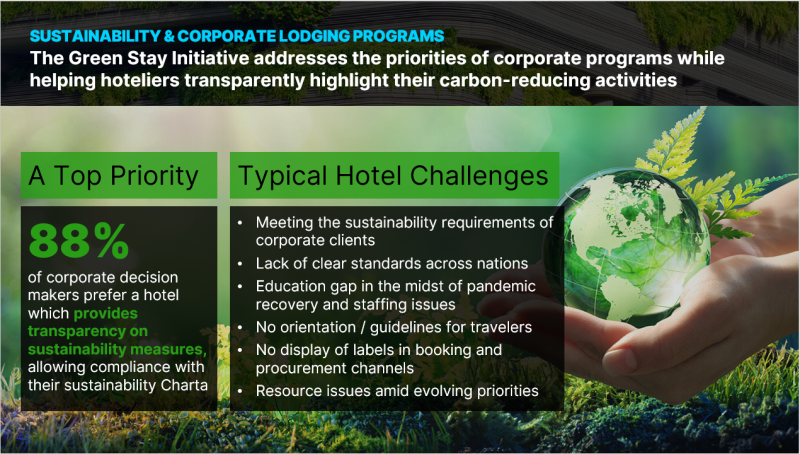It’s been a little more than a year since HRS—a hospitality company that connects brands, regional groups and independent hotels with corporate hotel program managers—launched its Green Stay Initiative. In that time, a number of large-scale and smaller hospitality companies have signed on to the initiative, a platform that helps hoteliers and corporate hotel program managers share information on how businesses are meeting sustainability standards.
The initiative aims to help hotels share performance metrics on energy, water and waste and also to help corporate clients find hotels that meet internal sustainability standards. Using a scoring system based on methodologies from the Greenhouse Gas Protocol, the Hotel Carbon Measurement Initiative, the Sustainable Hospitality Alliance and the World Travel & Tourism Council, HRS provides analytical data to travel professionals to review during the hotel procurement process. When reviewing booking displays, icons highlight certified hotels in the program.
“We have reviewed—and we continue to review—the third-party certification methodologies and what[ever their] approach is,” said Martin Biermann, chief product officer at HRS. Some third parties provide self-assessment checklists for properties to fill out, and then confirm if the assessment is consistent through available documents. This is sufficient for HRS’ basic and advanced ranking levels, Biermann said, but for the expert level, HRS validates how each third party certifies various components, particularly the ISO 14064 series to assess carbon footprints.
Michael Brophy, a spokesperson for HRS, noted that different countries have different regulations and requirements for companies to report on their sustainability and their carbon footprint. “So it's critical for hoteliers working in and providing services to these different companies to be able to provide that information,” he said. When a company does its reporting to government authorities, the information can be audited by organizations in that nation, he said. Biermann said that corporate customers can configure weights for each of the questions. From this, HRS determined that different regions emphasize different values in sustainability—for example, if German businesses exceed their European Trading Scheme allowances on carbon emissions, they have to pay penalties, he said, while the West Coast of the United States is more focused on water management.
Biermann noted different challenges facing asset-light hotel groups compared to those businesses that own the real estate and are responsible for the life cycle footprint of a hotel. “In the real estate industry, 50 percent of the greenhouse gas emissions of the building [are] emitted in the time it is built,” he said. “So there is a very high focus from real estate construction or investment companies to lower that part of the footprint of the building during the construction.” This is especially crucial when owners are trying to secure funding and investment from their banks, he noted, and the lenders are concerned with environmental, social and governance ratings and low-life-cycle footprints.
As such, Biermann sees a difference in how different groups of individuals and companies think about sustainability. Investors are focused on the life cycle of a building and the specific metrics while operators and brands are more concerned on how guests perceive the property’s efforts to be environmentally responsible. “So there's a lot more focus on the furniture, a lot more focus on social and ethical aspects of the operation and a tremendous focus also on the environmental impact—but not too much on the direct measurable impact in terms of water footprint, carbon footprint and waste footprint,” he said.

Hotel Partners
As corporations take steps to meet sustainability standards, hospitality companies have been signing up for the platform. Paris-based Accor was the first global hospitality group to join the Green Stay Initiative in October, and the following month, Marriott International announced plans to participate in the Green Stay Initiative as part of a commitment to reach net-zero emissions by no later than 2050. In a statement at the time, Denise Naguib, VP of sustainability and supplier diversity at Marriott, said the Initiative would help the company “publicly and transparently report on our sustainability metrics and progress, and share the steps hotels are taking to deliver more sustainable lodging options to business travelers.”
Significantly, Brophy said, the HRS team designed the program to accommodate both large chains and smaller, independent hotels that may not have the same resources (or marketing budget) as the larger companies do. This, he said, will help them compete for corporate business.
Boutique chain Staypineapple is another HRS partner. “Our first and most primary objective is really around energy efficiency and decarbonizing our buildings,” said Dina Belon-Sayre, VP of operations and real estate assets for the company. Of the company’s 10 hotels, seven are running on renewable energy, which Belon-Sayre credits to deregulated markets that let businesses bid on energy suppliers. The company also has worked on reducing water usage, which Belon-Sayre said can be a challenge in hotels. “There's a bathroom for every 400 square feet of space,” she said, noting that replacing the toilets across the portfolio to higher-efficiency models helped the company reduce water usage by 35 percent.
“Most boutique hotel owners do not have the internal expertise or bandwidth to take on sustainability,” Belon-Sayre said. “People often think the stumbling block for sustainability is cost. And I can tell you, after 15 years [in the business], it is rarely a cost issue. It is more often a resource issue.”
While Staypineapple may not advertise how much water the company has saved by upgrading its toilets, Brophy said statistics like that are needed for corporate requests for proposals as travel planners seek hard data. “Being able to detail those kinds of metrics to corporate bookers that are now requesting precisely those kinds of figures really gives Staypineapple a leg up,” he said. “These kinds of elements are increasingly more influential when it comes to corporate [requests for proposal] that hoteliers like Dina are navigating.”
